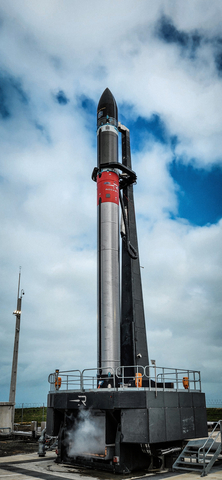Rocket Lab Brings Forward Milestone Recovery Mission
- Rocket Lab aims to make Electron the world's first reusable small orbital rocket.
- Rocket Lab has successfully recovered first stages from seven Electron launches.
- Rocket Lab will fly a pre-flown Rutherford engine for the first time, indicating progress towards reusability.
- None.
Insights
Analyzing...
Rocket Lab plans to recover the Electron rocket’s first stage during the Company’s upcoming 40th mission, and launch a pre-flown Rutherford engine for the first time, accelerating plans to make Electron the world’s first reusable small orbital rocket.

A recovery-configured Rocket Lab Electron launch vehicle sits on the pad at Launch Complex 1 in
Scheduled to launch as early 11:45 am NZST today (23:45 UTC) from Rocket Lab’s private orbital launch site in
As a recovery mission, Electron’s first stage will return to Earth under a parachute after launch and splash down in the Pacific Ocean several hundred kilometers down range from Launch Complex 1. Rocket Lab’s marine recovery vessel will then extract the stage from the ocean and transport it back to Rocket Lab’s production complex for analysis and testing. Rocket Lab has previously recovered first stages from seven Electron launches and ‘We Love The Nightlife’ is intended to be one of the final tests before the Company attempts to refly a booster for the first time in the coming months.
In addition to recovering the booster, Rocket Lab will fly a pre-flown 3D printed Rutherford engine for the first time. The engine previously flew on the first stage of the ‘There and Back Again’ mission, successfully launched in May 2022. The engine has since undergone extensive qualification and acceptance testing to certify it for re-flight, including multiple full mission duration hot fires where the pre-flown engine performed flawlessly.
“This mission is a big step toward reusable Electron rockets,” said Rocket Lab founder and CEO Peter Beck. “The engines we’re bringing back from previous recovery missions are performing exceptionally well through requalification and acceptance testing, so we’re excited to send one on its second trip to space as one of the final steps before reflying an entire first stage. Once again our team has demonstrated impressive responsiveness by swapping vehicles matter of days, enabling us to get Capella to orbit on schedule, while giving us another opportunity to splash down and recover a new booster. With the production team pumping out a new Electron rocket every three weeks, we have the unique ability to shuffle stages around to maintain a rapid launch cadence.”
The 'We Love the Nightlife' mission was previously scheduled for launch earlier this month, and was initially not destined to be a recovery mission, but low ignitor pressure on a single engine during an initial launch attempt required the team to stand down and conduct further analysis. To keep the mission on schedule, and also expedite Rocket Lab’s reusability efforts the fairing, with Capella payload integrated within, was swapped onto the next available recovery-configured first stage in Rocket Lab’s production line.
‘We Love The Nightlife’ will deliver the first of Capella’s next generation ‘Acadia’ Earth observation satellites. The mission will be Rocket Lab’s third launch for Capella following the successful ‘Stronger Together’ mission launched in March 2023 from Rocket Lab Launch Complex 2 in
The launch will be live streamed at www.rocketlabusa.com/live-stream. For real time updates on launch day, follow Rocket Lab on Twitter @RocketLab. Images and videos will be available for download on Flickr: https://flic.kr/s/aHBqjANcH8
Launch window opens:
- NZST: 11:45 – 15:30, August 24th
- UTC: 23:45 – 03:30, August 23rd
- EDT: 19:45 – 23:30, August 23rd
- PDT: 16:45 – 20:30, August 23rd
+ About Rocket Lab
Founded in 2006, Rocket Lab is an end-to-end space company with an established track record of mission success. We deliver reliable launch services, satellite manufacture, spacecraft components, and on-orbit management solutions that make it faster, easier and more affordable to access space. Headquartered in
+ About Capella Space
Capella Space is an information services company that provides on-demand, industry-leading, high-resolution synthetic aperture radar (SAR) Earth observation imagery. Through a constellation of small satellites, Capella provides easy access to frequent, timely, and flexible information affecting dozens of industries worldwide. Capella’s high-resolution SAR satellites are matched with unparalleled infrastructure to deliver reliable global insights that sharpen our understanding of the changing world – improving decisions about commerce, conservation, and security on Earth. Learn more at www.capellaspace.com.
+ FORWARD LOOKING STATEMENTS
This press release may contain certain “forward-looking statements” within the meaning of the Private Securities Litigation Reform Act of 1995, Section 27A of the Securities Act of 1933, as amended, and Section 21E of the Securities Exchange Act of 1934, as amended. All statements, other than statements of historical facts, contained in this press release, including statements regarding our expectations of financial results for the third quarter of 2023, strategy, future operations, future financial position, projected costs, prospects, plans and objectives of management, are forward-looking statements. Words such as, but not limited to, “anticipate,” “aim,” “believe,” “contemplate,” “continue,” “could,” “design,” “estimate,” “expect,” “intend,” “may,” “might,” “plan,” “possible,” “potential,” “predict,” “project,” “seek,” “should,” “suggest,” “strategy,” “target,” “will,” “would,” and similar expressions or phrases, or the negative of those expressions or phrases, are intended to identify forward-looking statements, although not all forward-looking statements contain these identifying words. These forward-looking statements are based on Rocket Lab’s current expectations and beliefs concerning future developments and their potential effects. These forward-looking statements involve a number of risks, uncertainties (many of which are beyond Rocket Lab’s control), or other assumptions that may cause actual results or performance to be materially different from those expressed or implied by these forward-looking statements. Many factors could cause actual future events to differ materially from the forward-looking statements in this release, including risks related to delays and disruptions in expansion efforts; our dependence on a limited number of customers; the harsh and unpredictable environment of space in which our products operate which could adversely affect our launch vehicle and spacecraft; increased congestion from the proliferation of low Earth orbit constellations which could materially increase the risk of potential collision with space debris or another spacecraft and limit or impair our launch flexibility and/or access to our own orbital slots; increased competition in our industry due in part to rapid technological development and decreasing costs; technological change in our industry which we may not be able to keep up with or which may render our services uncompetitive; average selling price trends; general economic uncertainty and turbulence which could impact our customers’ ability to pay what we are owed; failure of our launch vehicles, spacecraft and components to operate as intended either due to our error in design in production or through no fault of our own; launch schedule disruptions; supply chain disruptions, product delays or failures; design and engineering flaws; launch failures; natural disasters and epidemics or pandemics; any inability to effectively integrate recently acquired assets; changes in governmental regulations including with respect to trade and export restrictions, or in the status of our regulatory approvals or applications; or other events that force us to cancel or reschedule launches, including customer contractual rescheduling and termination rights; risks that acquisitions may not be completed on the anticipated time frame or at all or do not achieve the anticipated benefits and results; and the other risks detailed from time to time in Rocket Lab’s filings with the Securities and Exchange Commission (the “SEC”), including under the heading “Risk Factors” in Rocket Lab’s Annual Report on Form 10-K for the fiscal year ended December 31, 2022, which was filed with the SEC on March 7, 2023, and elsewhere. There can be no assurance that the future developments affecting Rocket Lab will be those that we have anticipated. Except as required by law, Rocket Lab is not undertaking any obligation to update or revise any forward-looking statements whether as a result of new information, future events or otherwise.
View source version on businesswire.com: https://www.businesswire.com/news/home/20230823216471/en/
+ Rocket Lab Media Contact
Morgan Bailey
media@rocketlabusa.com
Source: Rocket Lab USA, Inc.







